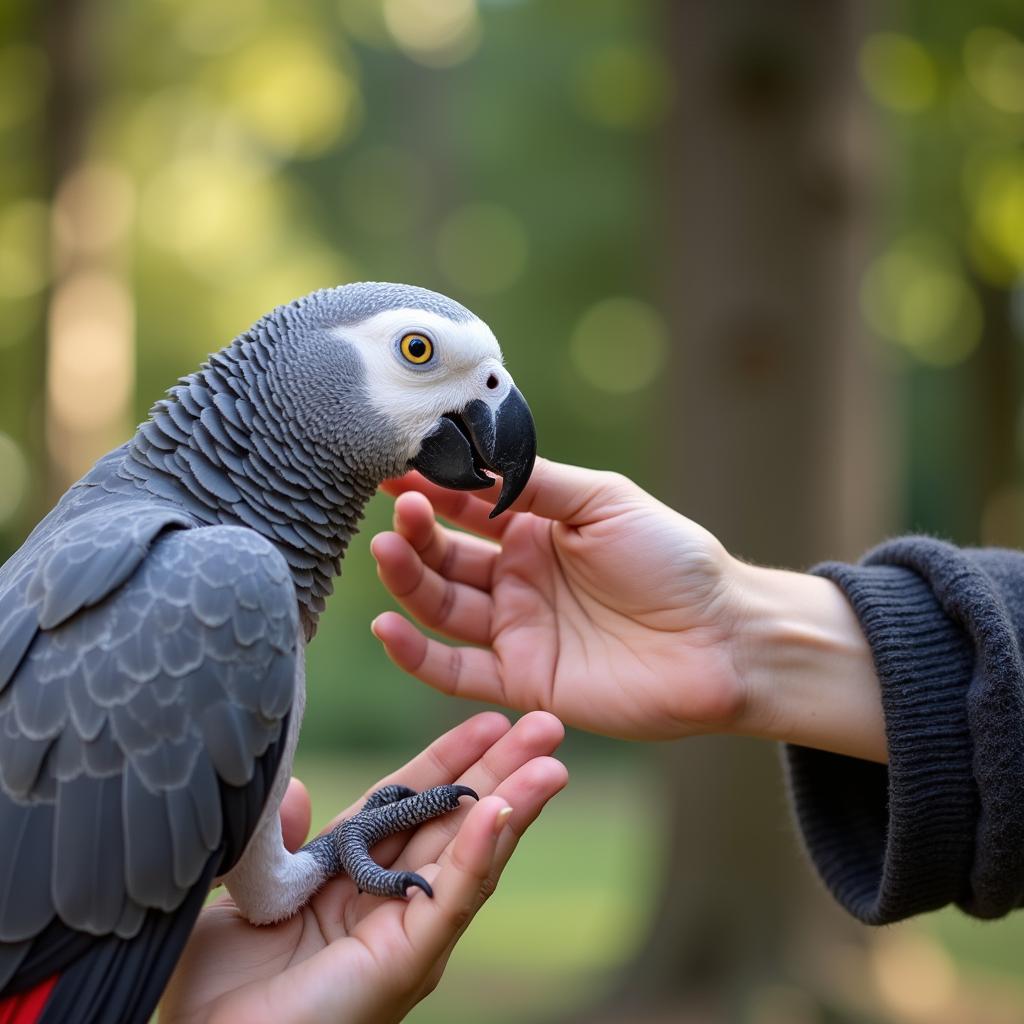Understanding and Addressing African Grey Parrot Behaviour Problems
African Grey Parrot Behaviour Problems can be challenging but are often manageable with understanding and patience. These intelligent birds require specific care and environmental enrichment to thrive. Addressing these needs effectively can prevent or resolve many behavioural issues. Let’s explore the complexities of African grey behaviour and how to navigate these challenges.
Decoding Your African Grey’s Distress Signals
African greys are renowned for their intelligence and ability to mimic human speech. However, this intelligence can also manifest in complex behavioural issues if their needs aren’t met. These behaviours can range from excessive screaming and feather plucking to biting and destructive chewing. Understanding the underlying causes of these problems is the first step towards effective solutions. One key aspect is recognizing that these behaviours are often not acts of defiance but rather communication signals indicating unmet needs or underlying stress.
One common issue is feather plucking. This distressing behaviour can stem from various factors, including boredom, stress, dietary deficiencies, or even underlying medical conditions. Similarly, excessive screaming can be a sign of loneliness, fear, or a need for attention. It’s crucial to rule out any medical reasons for the behavior by consulting an avian veterinarian. african grey parrot itching provides further information on potential causes of itching and feather plucking. Once medical issues are addressed, focusing on environmental enrichment and behavioral modification techniques is key.
Environmental Enrichment: Key to a Happy African Grey
A stimulating environment is crucial for preventing and addressing African grey parrot behaviour problems. Providing ample opportunities for physical and mental stimulation can significantly reduce the likelihood of destructive behaviours. Toys, such as puzzles and foraging toys, help keep their intelligent minds engaged. Offering a variety of perches made from natural wood helps exercise their feet and prevent boredom.
Nutrition and its Impact on Behaviour
A balanced and nutritious diet plays a vital role in an African grey’s overall well-being, including their behaviour. A diet deficient in essential vitamins and minerals can contribute to feather plucking and other behavioural problems. Consult african grey parrot care uk for further guidance on proper nutrition for your African grey. Providing fresh fruits, vegetables, and a high-quality formulated parrot diet is essential.
Addressing Specific Behaviour Problems
Dr. Avian Birdlove, a renowned avian veterinarian, emphasizes, “Understanding the specific trigger for a behaviour problem is crucial for effective intervention. A thorough assessment of the bird’s environment, diet, and daily routine is essential.” This expert insight highlights the importance of a holistic approach to addressing behavioural issues.
Biting: Understanding the Motivation
Biting is a common concern among African grey owners. While it can be a painful experience, it’s important to remember that biting is often a defensive mechanism. african grey parrot inf can help you identify potential infections that may be causing discomfort and contributing to biting behaviour. Fear, territoriality, or even hormonal changes can trigger biting behavior. Patience and consistent training are key to addressing this issue.
Screaming: Deciphering the Message
Excessive screaming can be frustrating for owners, but it’s essential to understand why your African grey is vocalizing. Loneliness, boredom, or even seeking attention can trigger screaming. african grey close their eyes n sit it meaning might offer insights into other forms of communication your parrot is using. Providing adequate mental stimulation and social interaction can help reduce screaming episodes. Dr. Birdlove adds, “Ignoring the screaming when it’s attention-seeking and rewarding quiet behaviour can be a very effective strategy.”
Creating a Harmonious Relationship
 African Grey Parrot Interacting with its Owner Building a strong bond with your African grey requires patience, understanding, and a commitment to meeting their complex needs. Addressing African grey parrot behaviour problems effectively involves a combination of environmental enrichment, dietary considerations, and behavioral modification techniques. By understanding the root causes of these behaviors and providing a stimulating and nurturing environment, you can foster a happy and healthy relationship with your feathered companion. african grey parrot toys uk offers a variety of toys that can contribute to a stimulating environment.
African Grey Parrot Interacting with its Owner Building a strong bond with your African grey requires patience, understanding, and a commitment to meeting their complex needs. Addressing African grey parrot behaviour problems effectively involves a combination of environmental enrichment, dietary considerations, and behavioral modification techniques. By understanding the root causes of these behaviors and providing a stimulating and nurturing environment, you can foster a happy and healthy relationship with your feathered companion. african grey parrot toys uk offers a variety of toys that can contribute to a stimulating environment.
In conclusion, addressing African grey parrot behaviour problems requires a proactive and understanding approach. By prioritizing their physical and mental well-being, you can help your African grey thrive and enjoy a long, fulfilling life as a cherished member of your family.
FAQ
- Why is my African grey plucking its feathers?
- How can I stop my African grey from screaming?
- What are the signs of a stressed African grey?
- How can I enrich my African grey’s environment?
- What is the best diet for an African grey?
- How do I train my African grey to stop biting?
- What are some common African grey parrot behaviour problems?
Need help with your African Grey parrot? Contact us at +255768904061, [email protected] or visit us at Mbarali DC Mawindi, Kangaga, Tanzania. Our 24/7 customer service team is here to assist you.


